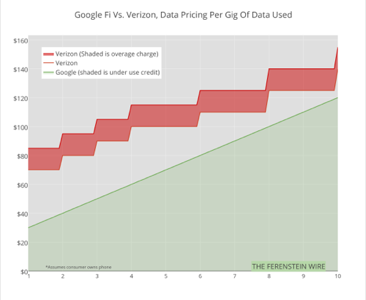This post first appeared on the Ferenstein Wire, a syndicated news service; it has been edited. For inquires, please email author and publisher Gregory Ferenstein.
Google unveiled an ambitious new plan to take on wireless carriers Wednesday with the launch of its own wireless telecom service, Project Fi. Google CEO Larry Page is reportedly frustrated that AT&T and Verizon just haven’t been interested in building better infrastructure. So, he launched his own wireless service — with a twist.
See also: Project Fi Is Google’s Blueprint For The Future Of The Network
Google’s pricing plan seems like a clever math trick to align profits with the incentive to build out more data infrastructure, so that carriers face the right incentives to keep up with demand. Under Google’s pricing, wireless carriers only make money when consumers use data, because consumers are charged exactly for what they use. If a consumer has a $60 6GB data plan and only uses 5.5GB, they only pay $55 for the data.
The math trick is to increase price linearly with data use.
Aligning Profits With Demand

Unlike most wireless carriers, Google makes most of its money when consumers actually browse the Web. AT&T, Verizon and Sprint profit when users pay for data they never use or accidentally go over their rate allowance.
The upshot is that most wireless carriers have these tricky pricing plans of hidden fees, overage charges, complicated contracts and odd incremental upgrades. (AT&T, for instance, has a 6GB and a 15GB plan—but nothing in between).
In some instances, these companies benefit from users who consume less data, since they charge more per gigabyte for low rate plans (illustrated in the bottom left side of the graph above).
In other words, these companies have no particular reason to build out their wireless infrastructure in order to keep up with increasing demand. Instead, they’d rather call you a data hog and throttle your connection if you to use more than they think you ought to be using.
See also: How All The Major U.S. Carriers Throttle Your Wireless Data
This odd business strategy reportedly irks Google. The Information’s Amir Efrati reported:
For Google, a mobile offering would fit neatly into CEO Larry Page’s playbook. He hasn’t been shy about discussing with subordinates his disdain for existing wireless carriers and telecom companies who he believes have been much too slow to upgrade their networks and heavy-handed in trying to control the services that subscribers use on their devices.
So, Google is offering monthly data plans: $20 unlimited text/talk and $1 per 100MB of data (i.e., a 2GB data plan will set you back a total of $40, plus taxes). It partnered with both Sprint and T-Mobile, so phones should effortlessly switch to whatever network is best in a given area. Under this grand scheme, there’s no incentive to lock users to a single wireless network or come up with tricky plans aimed at tripping up consumers.
If a consumers uses more data, the carrier has simple incentive to build out faster and more reliable capacity. It’s ambitious in its simplicity. And, if it works, America might actually catch up to the rest of the world with faster, cheaper, mobile broadband.
Lead photo by Ervins Stauhmanis

















